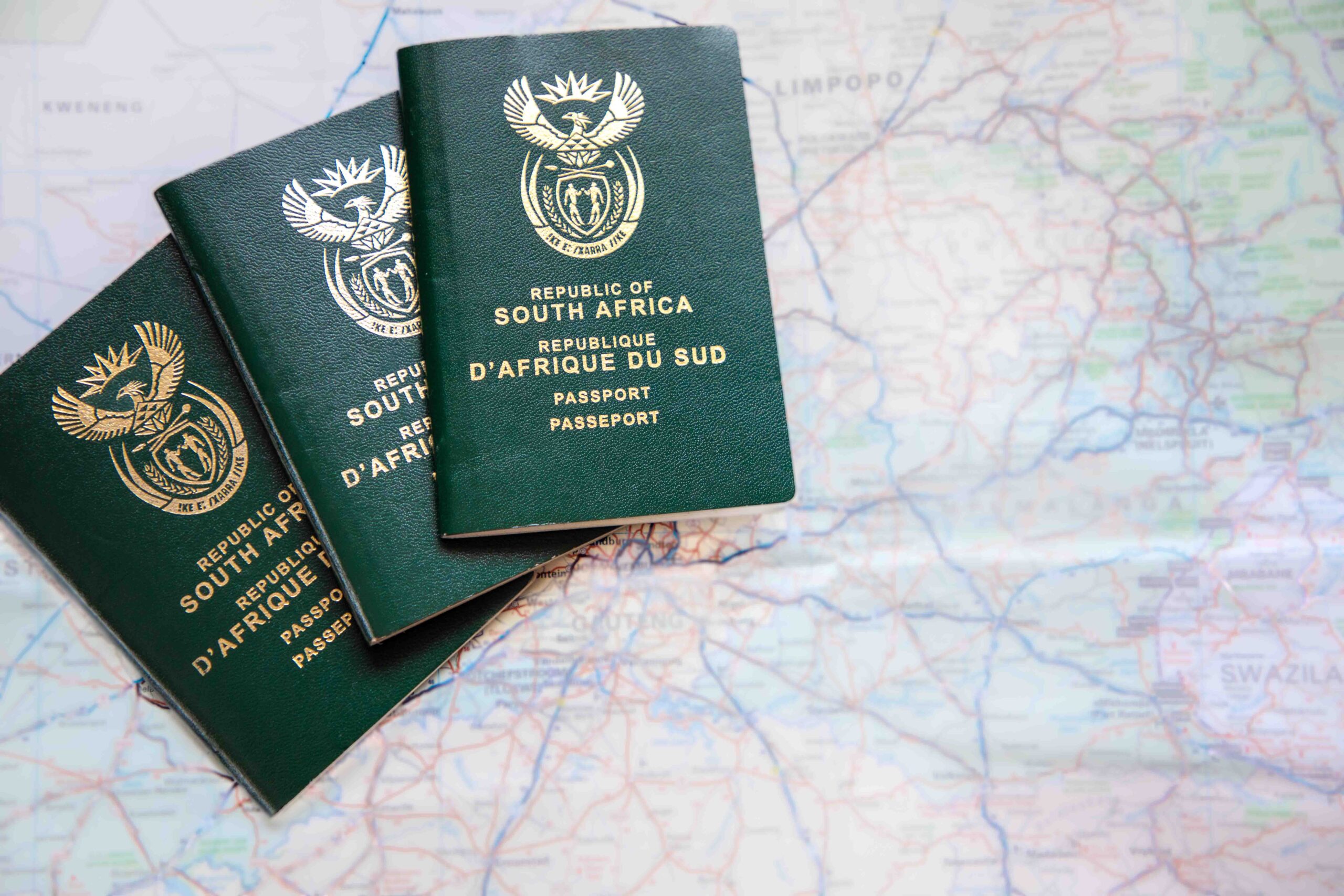Replacing French on the cover of the South African passport is a small yet liberating act to help fulfil the true journey towards the representation, validation, and affirmation of linguistic identity, sovereignty, and freedom, writes Koffi Kouakou
What’s the point of having French written on the South African passport today? What does it mean, stand for, and how helpful is it? Even more important, why aren’t any South African languages written on the passport?
One could ask the same question about the British passport. On the front cover of the British passport, on the Royal Coat of Arms, are the mottoes of the monarch of the UK in French that say, “Dieu et mon Droit” and “Honi soit qui mal y pense”, respectively translated as “God and my right” and “Shamed be whoever thinks ill of it” or “Evil be to him who evil thinks”.
The origin of these French maxims dates back to a dialect, Old Norman French language, spoken by the medieval ruling class in England. That explains it.
But French, on the cover of the South African passport? That’s unusual.
These reasonable questions will surprise many but will also tease the curiosity of South Africans and pan-Africanists, given the constant rhetorical cultural pride for the imperative use of African languages. But it is worth asking as it’s quite a puzzle to many people, including myself.
In asking these questions, I want to examine the linguistic and diplomatic puzzles, their functional, symbolic, and geopolitical meanings that allow English and especially French to occupy the centre stage on the South African passport today.
Furthermore, I want to argue for a call to decolonise the South African passport and to free it from the cultural bondage and occupation by these two European languages, if at all possible. And also suggest how it could be done.
Countless, but a few travellers and diplomats, are unaware that two languages are written in the South African passport—English and French. Until 1994, Afrikaans was the other language.
Yes, French! But no African languages. A closer look at it reads Republique D’Afrique du Sud and Passeport, both in capital letters. One wonders, why French?
Many reasons explain such a perceived anachronism.
The functional and symbolic reasons stem from the history of passport design and the making of the modern South African passport. Passport design tells a lot about the nation it claims to identify. The colours, the coat of arms, symbols, and decorations of the pages represent vistas into the cultures of a country.
Nonetheless, the covers of passports in the world hold plenty of information difficult to grasp.
The South African passport, with its uniqueness, has among others an unusual feature—French on its cover.
Yet French is not one of the 12 official languages of South Africa, which include sign language, although many nations have their official languages, as well as the English language, on their passport. Moreover, South Africa, unlike many African countries, is not a former French colony.
The principal reason behind this feature is the consequence of the 1920 Paris Conference on Passports & Customs Formalities and Through Tickets of the League of Nations in Paris, France. For the first time, the conference set the standards for all passports issued by members of the league, of which the Union of South Africa was a member.
Interestingly, generals Jan Smuts and Louis Botha were the two representatives of the Union of South Africa. General Smuts played a key role in the drafting of the Covenant of the League of Nations.
Before the Paris Conference, there were no internationally agreed standards for passports as they were not required for travel until World War I. During that infamous and obscure meeting, the shape, validity, size, and other passport design format and rules were determined for every country in the world.
Even more puzzling, it was also mandated that “each passport was to be in French, as well as one other language of choice”.
So, one can assume that the South African passport still abides by that old 1920 European mandate and contains some French, outside or inside. That’s the official functional and symbolic explanation and the story behind French on the cover of the South African passport.
That was then, a century ago. Still, today much has not changed. In fact, passports have become necessary and ubiquitous for mobility and travelling across the globe.
There are all sorts—regular, tourism, diplomatic, and animal passports. First issued in 2009, the current South African passports come in six types; regular, maxi, child, official, and diplomatic, although I have been able to validate only five. I will spare you the long trip into the making of the modern South African passport. However, between 2019 and 2020, South Africa issued 782 047 new passports, up by 13% as compared with China, which issued 30 080 000, up by 21% in 2018.
According to the Department of Home Affairs, a “South African passport, a valid travel document issued to citizens of South Africa for the purpose of international travel, allows the bearer to travel to foreign countries in accordance with visa requirements, and facilitates the process of securing assistance from South African consular officials abroad, if necessary.”
Today, passports are more than a document of travel for entry and exit of a specific border nation. They have an influential, geopolitical, and economic value for global citizenship. They are powerful instruments of both access and denial to living standards around the world.
Having a reputable passport from an influential country gives one the freedom and power to move about and live in the world with few restrictions. The contrary is also evident.
Passports are also traded as commodities and listed on a global ranking system. According to the Henley & Partners report, that there are recent growing inequalities between the West and the global South as “restrictive policies initially introduced to contain the spread of COVID-19 are now being conveniently applied to contain mobility from the global South”.
The 2021 global ranking, dominated by European passports, has two main levels—the world’s most desirable or known also as powerful passports and the worst passports to hold.
The 2022 Henley Passport Index ranks South Africa 55th, with access to 105 visa-free destinations in comparison to the top two tiers, such as number ones Japan and Singapore (192 destinations) and twos, Germany and South Korea (190).
South Africa’s place in the hierarchy of world power, soft and hard, will affect the global reputation of its passport and the benefits that come with it and to its holders.
So far, the South African passport, with French on it, is reputable and ranks favourably among and in between both destination levels. But South Africans still require a visa to visit France and vice versa. What an irony!
Does French on the cover of the passport give it geopolitical weight in the world? I doubt it. Even if French was dropped off the cover of the South African passport, would it have lesser geopolitical importance? Not at all.
There is a cultural imperative that should govern the identity and sovereignty of the South African passport today—language as a unifying credo. Identity and sovereignty are twin sisters and the languages that express and bind them together cut across many levels and tell a lot about their history, present and future story, place and geopolitical power in the world.
Of all symbols of identity and sovereignty today, the passport is perhaps one of the modern tools of self-referral and representation beyond the borders of one’s nation. It is the undeniable and almost absolute key to mobility in our world today. Furthermore, it embodies unique linguistic mother-tongue expressions. It tells the story of nations to another and opens or closes the doors to nations. That’s why an African language should be on the cover of the South African passport. It matters.

So, let’s ask my original question again. What’s the point of having French on the cover of the South African passport? The answer is self-evident. It serves very little and doesn’t make sense for South Africans. Officially, South Africa has never been a linguistic colony of France. But I suspect it could be, commercially. The French presence is quietly deceptive. Besides, the South African passport remains linguistically and diplomatically occupied by the French language, in a bygone era of absolute linguistic domination. South African identity and sovereignty seem subjugated to the same language on its cover.
Would South Africans be glad to see Mandarin Chinese on their passport today or even in the future? Or would the French accept Zulu on their passport? I leave the answers to the wind.
Therefore, I call for the decolonisation of the South African passport and the linguistic overthrow of the French language to be replaced by another South African language. But many will ask, which South African languages should replace it, if at all? But importantly, what would a decolonised passport serve?
It should mean a lot and serve a big deal in a world where languages are prime expressions of freedom and power. Linguists will agree that African languages deserve pre-eminent usage, and the passport is a place for such global expression.
Decolonising the South African passport will not be easy as it will come at a cost and much resistance. But the requirements for such a linguistic shift will be functional, symbolic, economic as well as geopolitical and necessary.
The Departments of Home Affairs and International Relations and Co-operation could lead the initiative and make it happen swiftly.
Practically, I trust that ministers Aaron Motsoaledi and Naledi Pandor must be the main facilitators for such a linguistic decolonisation project with easy success.
The EFF party could possibly play an advocacy role, given their strong pan-Africanist ideology about the mandatory use of African languages.
Of course, the modest lessons learnt could inform and apply to the rest of Africa and other nations around the world. One key lesson would be the prominent use of African languages, such as Kiswahili and others, widely engage in diplomatic and growing continental trade.
Here the new African Continental Free Trade Area comes to mind. As with the EU and Ecowas (the Economic Community of West African States) among others in Latin America with CARICOM or the Caribbean Community and Asia, a common passport with a few carefully selected African languages might validate identity, and sovereignty, and boost both pride and trade.
The contentious history of the passport tells us that identity and sovereignty matter, and languages are their expressive links to their geopolitical values. The future of the passport will still be dictated by them, and African languages must count in global conversations.
It is hoped that future technologies will find ways to accommodate digital passports that will display any languages on their covers when needed. But for now, the world is still using paper and analogue systems.
Of all people, South Africans should know what their languages stand for and their power to unite, not to divide. The reminder of passports and associated languages that divided and restricted freedom of movement and mobility, i.e. the dom pass, because of one’s identities and sovereignty during the apartheid era, must be a warning.
While French is not a dividing language in South Africa, it should still be replaced with an African language.
Therefore, replacing French on the cover of the South African passport is a small yet liberating act to help fulfil the true journey towards the representation, validation, and affirmation of linguistic identity, sovereignty, and freedom.
I long to see that happen, soon.
Koffi Kouakou is an Africa Analyst and Senior Research Fellow at The Centre of Africa-China, University of Johannesburg.
This article first appeared on The African on 20 June 2022 and is published with permission.

